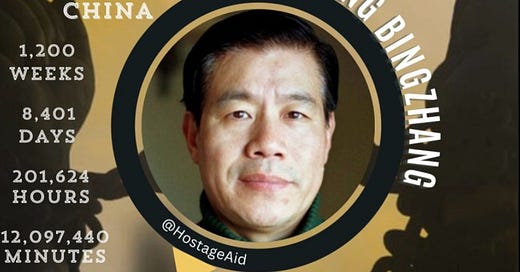From Beijing to Berlin: Why America Must Defend Its Own
Dr. Wang Bingzhang and the High Cost of Being American and US LPR Abroad
Hostage Aid Worldwide has launched a renewed global advocacy campaign on behalf of Dr. Wang Bingzhang, a founding figure of China’s pro-democracy movement and one of the longest-held political prisoners in the world today.
As this effort gains momentum, it is a timely opportunity to remind policymakers, the media, and the public that new laws and tools exist to confront hostage diplomacy and state-directed lawfare targeting Americans and U.S. lawful permanent residents (LPRs). The United States must act—and lead—with purpose.
Dr. Wang Bingzhang, a U.S. lawful permanent resident, has been wrongfully and unlawfully detained by Communist China for over two decades. In June 2002, he was kidnapped from Vietnam and secretly transferred to China. In early 2003, after a closed-door, half-day trial, Chinese authorities sentenced him to life imprisonment on fabricated charges of espionage and terrorism. He has been held in solitary confinement ever since, in clear violation of international norms and basic standards of due process.
This is not just a tragic case of political persecution—it is a direct affront to U.S. interests and values. Under 22 U.S.C. § 1741 et seq., a law enacted in 2020, the U.S. government has a statutory duty to prioritize the return of wrongfully detained Americans and U.S. lawful permanent residents held abroad by nation-states or hostile actors.
The law mandates the establishment of a structured framework to identify wrongful detentions, pursue accountability, and bring U.S. nationals home. This applies to political prisoners, dissidents, and even American businesspeople who fall victim to coercive legal tactics overseas.
Yet despite these tools, the U.S. government often moves slowly, not out of indifference, but because bureaucratic systems, including consular affairs, operate within a maze of diplomatic protocols, legal constraints, and political calculations. It is the nature of government to proceed cautiously, but that reality can come at a significant cost for those suffering unjust imprisonment. Speed and bold leadership are often what make the difference between a headline and a homecoming.
Recent warnings by former U.S. Ambassador to Germany Richard Grenell underscore the seriousness of this potential trend. In a widely shared post on X, Grenell criticized the treatment of an American tech entrepreneur facing prosecution in Germany, warning that U.S. companies should be alert to the rise of politicized legal actions against Americans abroad. Whether in China, Europe, or elsewhere, the weaponization of legal systems to target U.S. nationals appears to be a growing threat, and it must be addressed with equal urgency and consistency.
Now, more than 23 years into his detention, Dr. Wang’s advanced age and deteriorating health make this an urgent humanitarian issue. The U.S. must deploy every diplomatic, legal, and policy tool available to secure his immediate release. America does not abandon its own. Dr. Wang’s case must be front and center in all U.S.–China diplomatic engagements until he is safely reunited with his family.
To learn more about Dr. Wang’s case, visit Hostage Aid Worldwide, a non-profit founded by former hostages, families, and experts committed to ending hostage-taking and helping bring people home.





